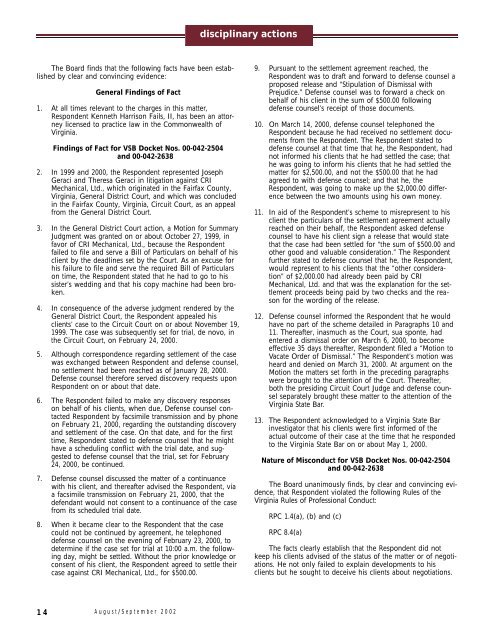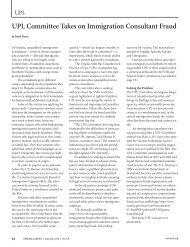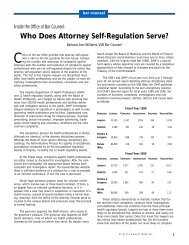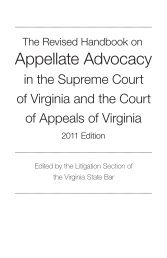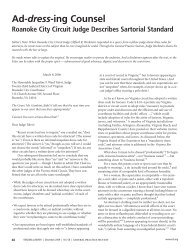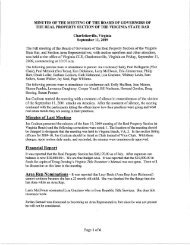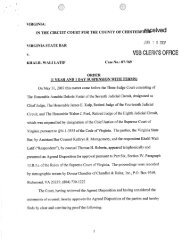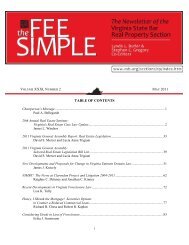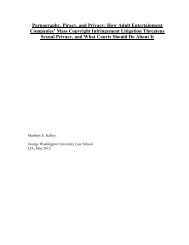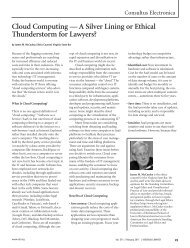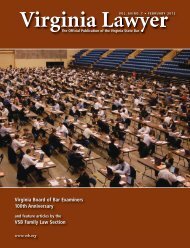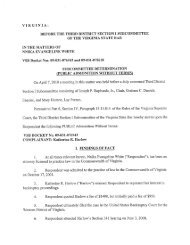Disciplinary Board Disciplinary Actions - Virginia State Bar
Disciplinary Board Disciplinary Actions - Virginia State Bar
Disciplinary Board Disciplinary Actions - Virginia State Bar
You also want an ePaper? Increase the reach of your titles
YUMPU automatically turns print PDFs into web optimized ePapers that Google loves.
The <strong>Board</strong> finds that the following facts have been established<br />
by clear and convincing evidence:<br />
1 4<br />
General Findings of Fact<br />
1. At all times relevant to the charges in this matter,<br />
Respondent Kenneth Harrison Fails, II, has been an attorney<br />
licensed to practice law in the Commonwealth of<br />
<strong>Virginia</strong>.<br />
Findings of Fact for VSB Docket Nos. 00-042-2504<br />
and 00-042-2638<br />
2. In 1999 and 2000, the Respondent represented Joseph<br />
Geraci and Theresa Geraci in litigation against CRI<br />
Mechanical, Ltd., which originated in the Fairfax County,<br />
<strong>Virginia</strong>, General District Court, and which was concluded<br />
in the Fairfax County, <strong>Virginia</strong>, Circuit Court, as an appeal<br />
from the General District Court.<br />
3. In the General District Court action, a Motion for Summary<br />
Judgment was granted on or about October 27, 1999, in<br />
favor of CRI Mechanical, Ltd., because the Respondent<br />
failed to file and serve a Bill of Particulars on behalf of his<br />
client by the deadlines set by the Court. As an excuse for<br />
his failure to file and serve the required Bill of Particulars<br />
on time, the Respondent stated that he had to go to his<br />
sister’s wedding and that his copy machine had been broken.<br />
4. In consequence of the adverse judgment rendered by the<br />
General District Court, the Respondent appealed his<br />
clients’ case to the Circuit Court on or about November 19,<br />
1999. The case was subsequently set for trial, de novo, in<br />
the Circuit Court, on February 24, 2000.<br />
5. Although correspondence regarding settlement of the case<br />
was exchanged between Respondent and defense counsel,<br />
no settlement had been reached as of January 28, 2000.<br />
Defense counsel therefore served discovery requests upon<br />
Respondent on or about that date.<br />
6. The Respondent failed to make any discovery responses<br />
on behalf of his clients, when due, Defense counsel contacted<br />
Respondent by facsimile transmission and by phone<br />
on February 21, 2000, regarding the outstanding discovery<br />
and settlement of the case. On that date, and for the first<br />
time, Respondent stated to defense counsel that he might<br />
have a scheduling conflict with the trial date, and suggested<br />
to defense counsel that the trial, set for February<br />
24, 2000, be continued.<br />
7. Defense counsel discussed the matter of a continuance<br />
with his client, and thereafter advised the Respondent, via<br />
a facsimile transmission on February 21, 2000, that the<br />
defendant would not consent to a continuance of the case<br />
from its scheduled trial date.<br />
8. When it became clear to the Respondent that the case<br />
could not be continued by agreement, he telephoned<br />
defense counsel on the evening of February 23, 2000, to<br />
determine if the case set for trial at 10:00 a.m. the following<br />
day, might be settled. Without the prior knowledge or<br />
consent of his client, the Respondent agreed to settle their<br />
case against CRI Mechanical, Ltd., for $500.00.<br />
A u g u s t / S e p t e m b e r 2 0 0 2<br />
disciplinary actions<br />
9. Pursuant to the settlement agreement reached, the<br />
Respondent was to draft and forward to defense counsel a<br />
proposed release and “Stipulation of Dismissal with<br />
Prejudice.” Defense counsel was to forward a check on<br />
behalf of his client in the sum of $500.00 following<br />
defense counsel’s receipt of those documents.<br />
10. On March 14, 2000, defense counsel telephoned the<br />
Respondent because he had received no settlement documents<br />
from the Respondent. The Respondent stated to<br />
defense counsel at that time that he, the Respondent, had<br />
not informed his clients that he had settled the case; that<br />
he was going to inform his clients that he had settled the<br />
matter for $2,500.00, and not the $500.00 that he had<br />
agreed to with defense counsel; and that he, the<br />
Respondent, was going to make up the $2,000.00 difference<br />
between the two amounts using his own money.<br />
11. In aid of the Respondent’s scheme to misrepresent to his<br />
client the particulars of the settlement agreement actually<br />
reached on their behalf, the Respondent asked defense<br />
counsel to have his client sign a release that would state<br />
that the case had been settled for “the sum of $500.00 and<br />
other good and valuable consideration.” The Respondent<br />
further stated to defense counsel that he, the Respondent,<br />
would represent to his clients that the “other consideration”<br />
of $2,000.00 had already been paid by CRI<br />
Mechanical, Ltd. and that was the explanation for the settlement<br />
proceeds being paid by two checks and the reason<br />
for the wording of the release.<br />
12. Defense counsel informed the Respondent that he would<br />
have no part of the scheme detailed in Paragraphs 10 and<br />
11. Thereafter, inasmuch as the Court, sua sponte, had<br />
entered a dismissal order on March 6, 2000, to become<br />
effective 35 days thereafter, Respondent filed a “Motion to<br />
Vacate Order of Dismissal.” The Respondent’s motion was<br />
heard and denied on March 31, 2000. At argument on the<br />
Motion the matters set forth in the preceding paragraphs<br />
were brought to the attention of the Court. Thereafter,<br />
both the presiding Circuit Court Judge and defense counsel<br />
separately brought these matter to the attention of the<br />
<strong>Virginia</strong> <strong>State</strong> <strong>Bar</strong>.<br />
13. The Respondent acknowledged to a <strong>Virginia</strong> <strong>State</strong> <strong>Bar</strong><br />
investigator that his clients were first informed of the<br />
actual outcome of their case at the time that he responded<br />
to the <strong>Virginia</strong> <strong>State</strong> <strong>Bar</strong> on or about May 1, 2000.<br />
Nature of Misconduct for VSB Docket Nos. 00-042-2504<br />
and 00-042-2638<br />
The <strong>Board</strong> unanimously finds, by clear and convincing evidence,<br />
that Respondent violated the following Rules of the<br />
<strong>Virginia</strong> Rules of Professional Conduct:<br />
RPC 1.4(a), (b) and (c)<br />
RPC 8.4(a)<br />
The facts clearly establish that the Respondent did not<br />
keep his clients advised of the status of the matter or of negotiations.<br />
He not only failed to explain developments to his<br />
clients but he sought to deceive his clients about negotiations.


